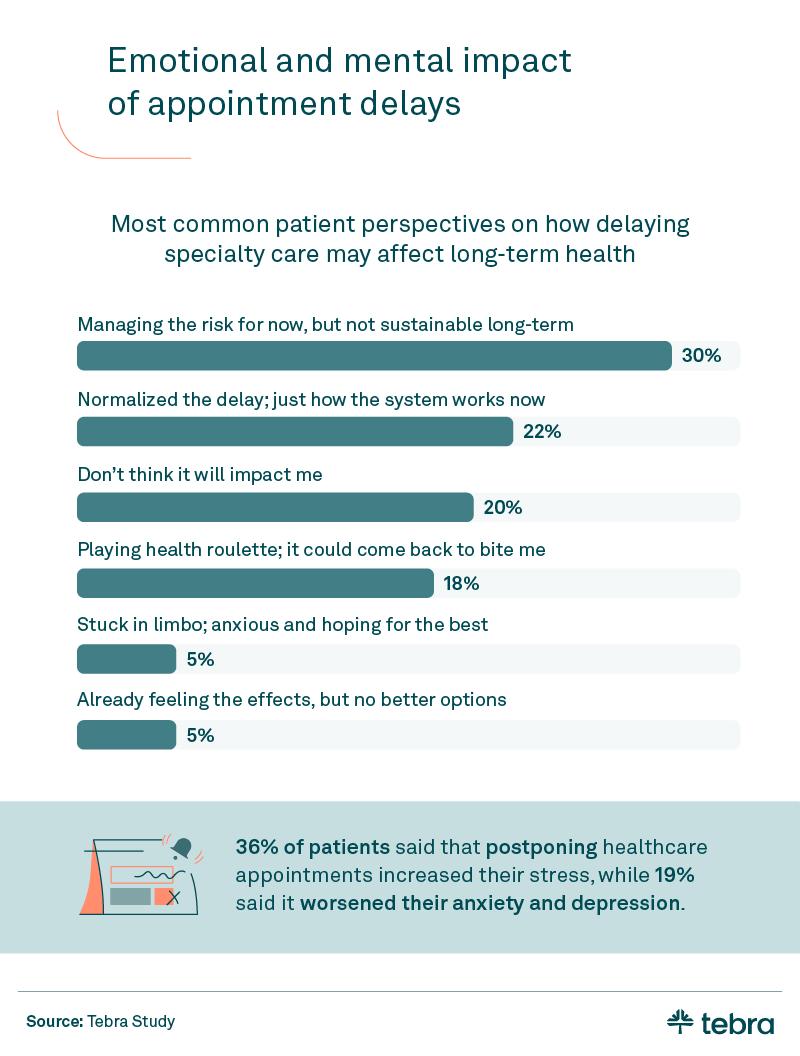
- In the last 12 months, 65% of Americans have delayed or skipped healthcare or specialty provider appointments; Gen Z is the most likely to have done so.
- 61% of patients have rationed medication or self-treated a health concern to avoid a specialist visit.</span>
- 77% of patients would trust a medical provider more if they offered price transparency and flexible communication upfront.
- Nearly 1 in 5 Americans (18%) admits to playing “health roulette” by delaying appointments; Gen Xers (25%) are the most likely to say so.
- Nearly 1 in 2 specialty healthcare providers (49%) have seen an increase in no-shows or appointment cancellations in the past 6 months; 42% have noticed fewer new patients booking first-time appointments.
- 3 in 4 specialty providers (75%) report digital tools have improved their patient retention and/or financial stability.
- 68% of specialty providers claim telehealth options are helping them maintain higher patient volume.
Patients across the United States are making tough choices about their healthcare, often postponing or canceling specialty appointments due to financial strain, limited insurance coverage and administrative burdens. For private practices, these delays translate to missed care opportunities and unpredictable revenue.
Tebra surveyed 806 patients and 200 healthcare providers to understand how today's economic climate is shaping patient behavior and how specialty practices are adapting to maintain continuity of care and business stability.
Why patients are putting off specialty care
Many patients are delaying care not by choice, but because of financial pressures and uncertainty. These complex financial and logistical challenges are reshaping how they engage with specialty and preventive care, affecting continuity of care and patient outcomes.

Over the past year, 65% of Americans delayed or skipped healthcare appointments. Gen Z led the trend, with 68% having done so, and women were nearly 50% more likely than men to delay or cancel an appointment. Another 61% of patients said they rationed their medication or self-treated a health concern in order to avoid seeing a specialist, with Gen Z being the most likely to have done so (64%).
Two-thirds of patients avoided seeing their regular doctor in the past year, and 30% of women skipped or delayed visits with their OB/GYN. Their most common reasons for doing so were thinking the issue wasn't urgent (26%), worrying about surprise costs (16%), and being unable to afford the visit (15%).
Gen Z was the generation most likely to have delayed care due to a lack of urgency (36%). Millennials were the most likely to avoid an appointment because they feared unexpected costs or not being able to afford it (17%).
Most common healthcare appointment skipped or delayed
| Doctor type | Overall | Men | Women |
| Primary care physician | 66% | 70% | 62% |
| OB/GYN | 19% | 2% | 30% |
| Dermatologist | 16% | 16% | 17% |
| Allergist | 7% | 6% | 7% |
| Dentist | 6% | 6% | 7% |
When asked specifically about the financial pressures delaying care, patients pointed to expensive co-pays as the top factor influencing their health decisions (28%). This was followed by concerns about large deductibles (21%), job or income insecurity (20%), and the inability to afford healthcare (20%).
Gen Z stood out again, with 25% citing affordability as their top financial pressure leading to delayed or canceled appointments. These findings echo a recent Kaiser Family Foundation study, which reported that many Americans find it difficult to afford healthcare costs. Within that survey, 36% had recently postponed or skipped care due to expense concerns.
Beyond potential physical risks, patients in Tebra's study also shared how missing healthcare appointments has affected their emotional and mental well-being.

Many patients know they're taking risks, with 30% believing they're managing for now but that it can't last long term. Nearly 1 in 5 also said they are playing "healthcare roulette," hoping their health holds out despite skipped care. Gen X was the most likely to admit this (25%). Twenty-two percent have normalized the delay, accepting the thought that this is just how the system works.
Over a third (36%) said delaying care added stress to their lives, while 19% reported increased anxiety or depression as a result. While fewer patients reported "stuck in limbo" — feeling anxious and hopeful for the best outcome — Gen Z felt this more than the average person (5% vs. 8%). Women were also 3.5 times more likely to feel this way compared to men (7% vs. 2%).
What motivates patients to show up
While the barriers to care are real, so are the solutions. Patients have made it clear what helps them follow through on appointments: transparency, accessibility, and communication.

Clear, upfront cost estimates and transparent billing information were the top incentive for keeping an appointment, cited by 53% of patients. Online scheduling (49%) and flexible rescheduling options (46%) were also top motivators.
Trust was another key factor. More than three-quarters of patients (77%) said they would trust a medical provider more if they offered price transparency and flexible communication upfront. When patients know what to expect (both financially and in terms of care) before entering your office, it strengthens the provider-patient relationship.
Digital convenience and patient engagement tools continue to influence patient choices about providers. Nearly half of patients prefer to manage appointments through patient messaging systems for medical practices like text or patient portals, and about a third prefer email. In fact, 37% said they've chosen one provider over another specifically because of better digital tools.
For private practices, offering clarity and convenience can help strengthen patient trust and improve continuity of care. Platforms like Tebra EHR+ help practices meet these expectations with built-in tools for automated reminders, flexible scheduling, and transparent pricing. Designed with private practices in mind, these systems reduce administrative burdens while helping practices build patient trust through streamlined communication and ease of access.
How specialty providers are adapting to fewer appointments
As patients delay care, specialty practices are seeing the ripple effects in their schedules. Providers are finding new ways to reach patients, retain business, and deliver care in flexible formats.

About half of specialty healthcare providers (49%) reported an increase in no-shows or last-minute cancellations over the past 6 months. On top of that, 42% noticed a drop in first-time appointments, a signal that fewer new patients are entering the pipeline.
In response, many providers are evolving their approach to meet patients where they are. Over one-third have increased their telehealth offerings, and 31% have adopted new digital solutions such as automated reminders, online scheduling, and secure patient messaging to streamline care delivery and reduce cancellations. These shifts are making a meaningful difference, with 68% of providers saying telehealth is helping maintain patient volume and 75% reporting that digital tools have strengthened patient retention and financial stability.
Telehealth is becoming integral to modern patient care, supported by interoperable digital health platforms that reduce barriers and improve patient-provider communication. As Harvard Medical School points out, when supported by the right systems and policies, virtual care has the potential to improve access, reduce barriers, and deliver better outcomes across the board. For private practices, that means the right technology can do more than fill gaps. It can also build a more flexible, sustainable way to stay connected with patients.
Conclusion: Building resilience through access and innovation
Delayed care affects everyone, from patients trying to manage their health to providers aiming to deliver consistent care. By offering upfront cost estimates, simplified digital scheduling, secure messaging, and personalized follow-ups, providers can reduce no-shows and help patients feel more confident about their care. With integrated EHR and patient management systems in place, private practices can enhance patient engagement, ease concerns about accessing specialty care, and keep care on track even when times are uncertain.
Methodology
For the first half of this study, Tebra surveyed 806 Americans about healthcare and specialty appointments, specifically about delaying and canceling appointments. Among respondents, 7% were Baby Boomers, 25% were Gen X, 50% were Millennials, and 18% were Gen Z. Additionally, 51% were women, 47% were men, and 2% were non-binary. For the second half of the study, Tebra surveyed 200 doctors and healthcare providers about no-showing patients and how they have adjusted their practice to adapt to new healthcare times.
About Tebra
Tebra, headquartered in Southern California, empowers independent healthcare practices with cutting-edge AI and automation to drive growth, streamline care, and boost efficiency. Our all-in-one EHR and billing platform delivers everything you need to attract and engage your patients, including online scheduling, reputation management, and digital communications.
Inspired by "vertebrae," our name embodies our mission to be the backbone of healthcare success. With over 165,000 providers and 190 million patient records, Tebra is redefining healthcare through innovation and a commitment to customer success. We're not just optimizing operations — we're ensuring private practices thrive.
Fair use statement
This information may be shared for noncommercial purposes with proper attribution. When quoting or referencing this content, please include a link back to Tebra.
- Current Version – Nov 24, 2025Written by: Jean LeeChanges: Updated to include the most relevant information available.
- Oct 31, 2025Written by: Ryan YatesChanges: Updated links and formatting.





